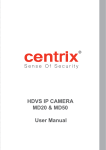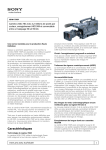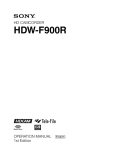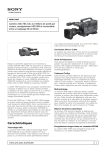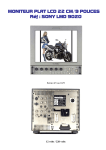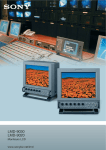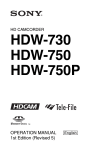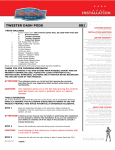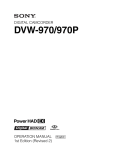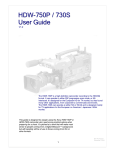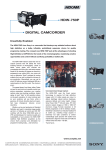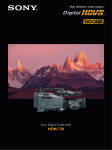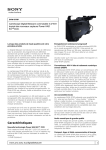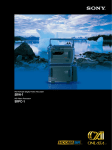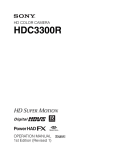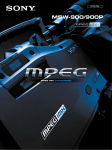Download HDW-F900R - Arizona MPS
Transcript
TM TM HDW-F900R Sony Digital Camcorder Exploring CineAlta – Liberating Movie Producers TM CineAlta – a name that proudly symbolizes the bond between cinematography and Digital high-definition imaging. It distinguishes a Sony family of products and systems that offer new levels of creativity in the production, postproduction, and exchange of motion pictures. It also brings together the quality and universality of 24-frame cinematography with the real-time capabilities, efficiency, and flexibility of Digital high-definition technology. And it stimulates the convergence of Motion Picture Film and Digital high-definition production on a global basis. CineAlta products, delivering cinema-quality pictures at selectable frame rates, are simplifying International Program Exchange by minimizing the need for standards conversion. They are also opening up entirely new possibilities for international co-production. Movie making has been liberated by the creative empowerment of the cinematographer. It is facilitated by real-time HD image evaluation on-set, instant replay of full-color high-resolution digital “takes,” real-time image optimization while shooting, a 50-minute shooting load, and most importantly, by the significant cost-benefits associated with this digital medium. CineAlta products provide a seamless bridge between 24-frame film originals and a final 24P digital master, giving each frame of film a one-to-one correspondence with progressive HD frames. The CineAlta environment readily interfaces with the computer graphics world, liberating postproduction. And the final liberation is achieved through the direct color conversion of progressive 24P masters to film, and to a host of other international digital HDTV and SDTV distribution formats. 2 New Creative Ways of Movie and TV Program Production In 2000, Sony set a groundbreaking milestone in the motion picture industry by introducing the HDW-F900 camcorder, which enabled high-definition digital images to be recorded onto digital tape at 24 frames per second. This totally new concept of 24P-based digital recording, together with the enabling Sony products, was named “CineAlta" Technology, and has since been embraced by an ever-broadening spectrum of producers, directors, and cinematographers all over the world. The HDW-F900, the first CineAlta camcorder, has served as an invaluable tool in movie and television program creation, bringing a new, higher level of efficiency, and flexibility to the production process. After the introduction of the HDW-F900 model, Sony has been continuously enhancing the CineAlta line by attentively listening to the diverse requirements of our customers. One of the most remarkable evolutions of the CineAlta line was the introduction of the HDC-F950 RGB 4:4:4 cameras and the HDCAM-SR format in addition to the HDW-F900 and its companion HDCAM-format VTRs. This new system concept was born of the requests of moviemakers working on highly exacting special effects sequences and producers creating elaborate commercials for cinema and television presentation. With these CineAlta products using the HDCAMTM and HDCAM-SR formats, Sony offers an outstandingly comprehensive range of high-quality gears, which allows customers to select the most appropriate equipment depending on their requirements for picture quality, budgets, applications. This highly respected HDW-F900 camcorder has now evolved into the next-generation HDW-F900R, offering a variety of enhanced functionalities. The HDW-F900R camcorder records images in accordance with the CIF (Common Image Format) standard, which specifies a sampling structure of 1920 x 1080 active pixels (horizontal x vertical). As well as recording at 24P, the HDW-F900R camcorder is switchable to record at 25P, 29.97P progressive scan, and also at 50 or 59.94 Hz interlaced scan. The camcorder also provides a comprehensive range of features for creative shooting such as enhanced gamma and colorimetry controls. The design of the HDW-F900R is highly compact and lightweight, giving users higher levels of mobility and comfort when shooting. To further enhance the creative and operational versatility of the camcorder, a wide range of optional accessories are available. These include a picture cache board, a 2-3 Pull-down, down converter board, and a slow-shutter board. In combination with its renowned 24P capability and attractive cost efficiency, all of these functionalities make the HDW-F900R the perfect solution for shooting television series, documentaries, commercials, as well as motion pictures. 3 The HDCAM Format Creative Versatility The 24-frame progressive capability of the HDCAM® format converges digital and film imaging, offering a new and novel creative flexibility for prime time television production, commercial production, and movie-making. Since Sony introduced the HDCAM format in 1997, it has been field proven worldwide, as a technology that offers highly mobile, compact 1080/60i digital acquisition and recording solutions. This reliable and robust format consistently delivers superb picture quality and is efficiently packaged onto 1/2-inch tape. Motion-capture for Cinematic Image Making The state-of-the-art, Sony HDCAM compression scheme is a frame-based digital compression strategy, where every frame of the signal is treated as a single entity. The HDCAM Format maintains exceptionally high picture quality and multi-generation robustness for both progressive and interlace signals. Advanced digital pre-filtering and dynamic bit-allocation for luminance and chrominance components (based on the statistical analysis of the picture content) are combined with a mild compression ratio of 4.4 to 1 to give a total on-tape recorded data rate of a modest 185 Mb/s at 60i. This, in turn, provides high-integrity camcorder recording in hostile environmental conditions. The frame rate switchability of the camcorder allows 24, 25 or 30 progressive frames per second capture as well as a choice of either 50 or 60 Hz interlace – all at the push of a button. In the same way that a film camera runs longer at a lower frame rate, the HDW-F900R records longer runs when operating at the lower frame rates. Consequently a BCT-40HD cassette, records up to 40 minutes of 60i or records up to 50 minutes of 24P, cinema-quality, material. The costs of the HDCAM tapes are much less expensive than those of film, bringing tremendous cost benefits in shooting. 4 10 This is the area where film and video have, up until now, differed most. Every film camera exposes a succession of still images (most usually 24 frames per second) that, when projected, effectively reproduce motion. Because of the time required for a film transport to move from frame to frame, half of the action is not registered and this gives material originated on film its specific footprint. On the other hand, many of digital cameras record interlaced images where two fields with temporal offset are used to capture one frame. This covers almost the entire action, for a smooth motion portrayal. When an HDW-F900R is set to a 24P frame rate and with a shutter speed of 1/48 second, it captures moving pictures in precisely the same manner as the film camera and produces results with the same motion footprint as footage shot on film. As well as a 24P frame rate, the HDW-F900R has a unique range of optional frame rates available. The progressive CCD sensor is able to capture progressive images at frame rates at 23.98, 24, 25, and 29.97 frames per second. Traditional interlace material can also be captured when an HDW-F900R is set to field rates of 50, and 59.94 Hz interlace. The extent of these frame rates provides the ability to shoot in both the film and television program genres. It also offers the means for some creative speed change for special effects (for example shoot at 29.97P and playback at 24P slow motion). The Art of Image-making New Ergonomics The progressive scan CCD sensor at the heart of the HDW-F900R marks a significant advance in Sony HAD CCD technology. It is a development that now makes possible image capture over a range of frame rates, so that their quality is at the highest possible level. This progressive scan CCD sensor provides a sensitivity of f10 at 2,000 lux (at 59.94i) providing subjectively noise and grain-free pictures. At 24 fps, with a 1/48-second shutter speed (equivalent to a 180º film camera shutter setting), the exposure index of the HDW-F900R is approximately equivalent to 300 ISO*. It allows the acquisition of gain-free imagery in deeply shadowed areas of a scene. Superb CCD highlight-handling greatly extends the Exposure Latitude of the camera allowing directors the dramatic freedom to shoot and capture extreme highlights in otherwise low-key scenes. As part of Sony’s continuous efforts to make the design of our camcorders to be user-friendly and practical, stylish and appealing, the design of the new HDW-F900R has been greatly refined to increase the comfort and versatility. One of the most significant features in the HDW-F900R design is the camcorder’s compact size – the length of the camera body is 20% shorter compared to the previous model. In addition to its compact size, the HDW-F900R provides HD-SDI output directly from the camera body, moving from analog outputs of the preceding model. The more compact nature of the camcorder makes it extremely easy and flexible to use when shooting in space-constrained locations, such as in a car. The HDW-F900R is also extremely lightweight – 2.6 kg lighter than the previous model. Even with the viewfinder, battery, cassette, microphone, and a small variable or fixed-focal length lens, the total weight is only approximately 12 lb (5.4 kg). The streamlined design inherits the superb weight distribution and balance from the previous model, yet provides much higher mobility, making the camcorder particularly suitable for hand-held shots. It also sits comfortably on the shoulder and can be more easily carried. The HDW-F900R incorporates a B-4 lens mount that facilitates quick lens replacement, which is also reinforced to support heavy lenses. All switches, meters, and indicators are positioned in the most logical places for optimum functionality and ease of use. It can be readily mounted on a Steadicam™ system or mounted on a tripod, geared-head, or motion-control system. This compact and lightweight camera opens new possibilities for creative camera work, while delivering uncompromising picture quality. *Based on Sony’s own measurements. The Mastery of Signal Processing Picture Tonal Reproduction is substantially enriched in the HDW-F900R by the adoption of an advanced CCD with a wide dynamic range and a 12-bit A/D converter that is then followed by powerful, high-speed, Advanced Digital Signal Processing (ADSP). ADSP allows the active manipulation of many picture parameters to expand the use of in-camera effects. 5 Cassette Loading Internal Light System The cassette loading of the HDW-F900R is fast, simple, and reliable. It takes less than 5 seconds* for cassette change. This facility and long recording runs (40-50 minutes depending on the selected frame-rate) offer high levels of efficiency on location. The loading mechanism is robust and designed to be dust-, moisture-, and drip-resistant. The vertical cassette loading also helps to minimize the risk of airborne contaminants from entering the loading mechanism. A two-pin socket in the HDW-F900R provides up to 50 watts of power from the attached lithium-ion battery. This can be used to power a variety of ancillary devices, including a front-light that can be mounted on the upper part of the handle. The power can be switched on and off manually or, when in Auto mode, it can be set to be synchronized with the operation of the Record button. *Based on Sony’s own measurements. Safety Zone Marker Optical Filter Wheels To allow for individual production requirements, the HDW-F900R provides a Safety Zone Marker user adjustable for any aspect ratio. Two independent filter wheels (each with four filter positions) are provided on the HDW-F900R, one with Neutral Density (ND) and one with Color Correction (CC) filters are installed. High Quality Audio Recordings Simulated image Extended Clear Scan The Extended Clear Scan function is particularly useful when shooting scenes that contain computer or TV screens as it minimize the horizontal bars that can appear. The ECS shutter speed is continuously variable. When the camera is operated at 24P with a 1/48second shutter speed, it exactly emulates the motion blur of a film camera operating at 24 fps with a 180º shutter. 6 The HDW-F900R is equipped with a range of balanced audio interfaces; an analog 5-pin XLR connector for stereo audio output, two 3-pin XLR connectors with selectable MIC/Line level input, and the front microphone input. The two 3-pin XLR connectors can also be switched to accept four channels of AES/EBU digital audio input, establishing a highly functional digital EFP audio system using the Sony DMX-P01 Digital Portable Mixer. Creative Versatility Dual HD-SDI Outputs In response to the requirement for convenient and high-quality on-set monitoring, two HD-SDI outputs have been incorporated into the HDW-F900R as standard. Recording on Sony HDCAM-SR Recorders The HDW-F900R can feed camera output signals via its HD-SDI connector for recording on external VTRs such as Sony SRW-1 HDCAM-SR™ portable recorders. LCD Status Panel and Diagnostic System All the main operational controls and switches are located on the left-hand side of the HDW-F900R camcorder. The LCD panel is on the same side, and shows a wide range of status and diagnostic displays such as Tape Remaining, Battery Level, and Audio Levels. Adjustable Shoulder Pad The position of the shoulder pad on the HDW-F900R can be easily adjusted – forwards and backwards – without tools. This means the operator can always attain a comfortable and well-balanced camera position. Assignable Button Viewfinder Return, Record, and other functions can be assigned to this switch on the HDW-F900R. Microphone Volume Protection A protection cover located under the volume knob of the front microphone on the HDW-F900R is provided to prevent operators from accidentally changing the volume. Electronic Shutter The electronic shutter on the HDW-F900R helps in capturing clear images of fast-moving objects by selectively minimizing motion blur. 7 Contrast Range The HDW-F900R can handle a very impressive contrast range. For the most challenging of light settings and associated scene conditions, several useful operational features are available that allow image optimization in real-time to help capture the desired mood of a shot. The first of these important functions is RGB Gamma Balance. By changing gamma balance, it is possible to change the color balance of the mid-tones without affecting black and white balance. The second feature, Black Gamma, allows fine adjustment of tonal reproduction in the shadows (black) to be made. This can help to bring out details from the dark parts of the picture without affecting mid-tones and with the absolute black level remaining unchanged. It is particularly helpful for dark scenes when the black has to stay black, but there is a requirement to pull out more details. The range of creative possibilities offered by modifying RGB Gamma Balance and changing Black Gamma is quite inspiring and, when mastered , offers a great advantage in achieving a desired ‘look’. 8 14 Standard Gamma Black Gamma ON Simulated images Creative Versatility Enhanced Gamma Features In addition to artistic and skilful lighting, in-camera gamma setting plays important role to deal with contrast range and to give a specific “look” to the image. In order to meet a broad array of customers’ demands, the HDW-F900R offers flexible options to faithfully reproduce the desired “look” of the image. HyperGamma HyperGamma is a set of new transfer functions designed to provide powerful contrast handling by manipulating the capacity and wide dynamic range of the Power HAD CCD sensor. These functions are quickly accessed via the set-up menu. Operators can select one curve from a choice of four that best suits their needs and conditions. For example, you can choose to enhance the reproduction in low-key areas to obtain best color grading in the digital intermediate process, and much more. Furthermore, HyperGamma delivers effective on-set monitoring, therefore HyperGamma does not require any additional external devices or equipment. Low Light Condition High Contrast Scene Simulated images Output [%] 120 100 80 60 40 Standard HyperGamma 1 HyperGamma 2 HyperGamma 3 HyperGamma 4 20 Set-up Menu 0 0 100 200 300 400 500 600 Input [%] User Gamma Capability This is a useful gamma feature for cinematographers who desire custom-made gamma curves for their projects. It allows them to quickly set up and load the gamma curves edited by the CVP File Editor* gamma creation software running on a Microsoft ® Windows ® PC. This software allows the gamma curve to be visually edited using an easy-to-use GUI, simply by plotting the x and y values of each point of the curve. Once the gamma curve has been created, it can be easily loaded into the HDW-F900R using a Memory Stick media card. TM *For details of the CVP File Editor, please refer to the HDW-F900R Operation Manual. 9 Highlight Handling Sony Advanced TruEye™ processing in the HDW-F900R allows much improved highlight handling, with faithful color reproduction. Conventional Video Equipment TruEye Colorimetry The HDW-F900R produces pictures with astonishing color reproduction accuracy. Its Multi Matrix function also offers unique possibilities for creative intervention by allowing selective color enhancement or alteration. Multi Matrix allows a particular color to be selected and its hue changed over a range of approximately 20 degrees. The level of saturation can also be modified. This permits some very interesting “in camera” effects – similar to the secondary color correction normally reserved for post production special effects work – and is performed at the full bit depth. Multi Matrix ON Simulated images 10 Creative Versatility Definition – Picture Sharpness The HDW-F900R produces extremely delicate pictures with fine detail. The CCDs, each with 2.2 million pixels, faithfully capture images with natural sharpness. The HDW-F900R also incorporates some new and innovative image enhancement functions, allowing very precise control of the way the picture texture and edges are represented. The first of these new features is Soft Focus. The Soft Focus adjustment is particularly convenient for those who find conventional digital images to be too sharp and allows more cinematic pictures to be created. In concert with optical filtration, this additional digital filtration can add a new creative extension to the treatment of image softness – and it can be optimized in real-time on the set. The second feature, Adaptive Detail Control (also known as Knee Aperture), allows the image detail enhancement in the highlight areas to look more natural. The third feature is Skin Tone Detail. This controls the detail level of objects with specific color tonality. It is particularly useful when shooting talents with the intent to creatively alter and soften the texture of their facial appearance while the remainder of the scene retains its full crispness. Within selected areas, details can be enhanced as well as softened. Three sets of such correction parameters can be applied simultaneously. Conventional Video Equipment Ch 2 ON Adaptive Detail Control Ch 1 ON Soft Focus ON Ch 2 ON Simulated images 11 Picture Stability Stop Motion and Time Lapse By its very nature any digital or video camera delivers rock steady pictures. The HDW-F900R is no exception. The picture stability is particularly relevant for productions incorporating multi-layered compositing special effects. Image weave, compounded by noise, is the enemy of all compression algorithms. The emergence of highly compressed MPEG-based delivery systems, including DVD and digital transmission using multiple GOPs (Group of Pictures) calls for a high level of picture stability to maintain picture quality – and digital acquisition is a major boon. With the HKDW-703 Picture Cache Board as standard, the HDW-F900R offers a frame-by-frame recording capability that provides stop-motion and time-lapse modes of operation in-camera. This offers new and innovative creative opportunities in both animation and model shooting. *The tape requires to be pre-striped on its LTC (at the desired frame/field rate) by the HDW-F900R that will be used in the actual shooting. Texture Because of its very good signal to noise ratio performance, the HDW-F900R delivers subjectively noiseless and grain-free pictures with the finest, most delicate and almost transparent texture. This can exploit the use of subtle cosmetics on the human face, as well as superb reproduction of fine-textured materials. This is extremely beneficial in commercial production. It is also particularly useful when working on productions that require multi-layering and blue-screen effects. The separation between useful information and unwanted grain or noise is straightforward and delivers accurate and spectacular results. 12 Simulated image Creative Versatility 13 Optional Accessories A full range of optional accessories is available to enhance versatility and operational features of the HDW-F900R. Down Converter Board (Optional) The HKDW-902R Down Converter Board* provides down-converted standard-definition (SD) output from the HDW-900R's 1080/59.94i or 1080/50i HD signal with four-channel embedded audio. The HKDW-902R also down converts 1080 23.98 HD signals to SD via 2-3 pull down circuitry. 14 Creative Versatility Picture Cache Board (Optional) The HKDW-703 Picture Cache Board, which was originally developed for the HDW-750 series camcorders, is now compatible with the HDW-F900R. It provides up to eight seconds of loop recording using solid state memory. Thus, when the REC start button is pressed, everything that happened up to eight seconds before that moment can be recorded to tape. In addition, time-lapse and frame-by-frame recording capabilities, known as the interval recording function, can be provided by this option board. Simulated image Slow Shutter/Image Inverter Board (Optional) The HKDW-905R Slow Shutter and Image Inverter Board** powerfully enhances the operational and creative versatility of the HDW-F900R camcorder. With the HKDW-905R equipped, the camcorder can slow its shutter speed down to a 64-frame period*. During such a long frame period, electrical charges accumulate on the CCDs, dramatically increasing sensitivity. This helps camera operators to shoot in extremely dark environments. In addition, because more picture blur occurs when shutter speed is reduced, the HKDW-905R allows operators to produce creative pictures when shooting moving objects, through the intentional use of blurred images. The image-inversion function of the HKDW-905R board also allows the use of a variety of image-inverting lenses, the Anamorphic Lens Adaptor, and cinema lenses with 2/3-inch adaptors. The slow-shutter function and the image-inversion function cannot be used simultaneously. *The shutter speed can be adjusted to a 1-, 2-, 3-, 4-, 5-, 6-, 7-, 8-, 16-, 32-, or 64-frame period. **The HKDW-905R is not compatible with the HDW-750 series camcorders. Remote Control Unit – RM-B750 (Optional) 2-3 Pull-down/Down Converter Board (Optional) This board also enables SD output to the HDW-F900R’s viewfinder or a monitor connected to the camcorder during 23.98P recording. With this function, users can check images on the viewfinder or monitor without the flickers that usually occur from 23.98P recording. For the down-converted SD signal, SD-SDI or analog composite can be selected via the camcorder’s set-up menu. The RM-B750 Remote Control Unit has been designed to establish a highly mobile and fully controllable camera system in the field by integrating control capability equivalent to a Master Set-up Unit into a compact unit powered from the device to be controlled. The RM-B750 can be connected directly to the HDW-F900R. Combination of an LCD touch-panel screen and direct push buttons enables full parameter adjustment of the camera to be controlled. When necessary, basic tape transport functions of the camcorder can be controlled. For further operational convenience, the RM-B750 has a Memory Stick media card slot so that various setup parameters can be stored and transferred between camcorders. Note: when outputting down-converted SD signals, one of the HD-SDI output connectors on the HDW-F900R will be utilized. RM-B750 15 Operational Accessories Color Viewfinders – HDVF-C30W (Optional) The HDVF-C30W, 2.7-inch(viewable area, measured diagonally) type HD LCD color viewfinder for the HDW-F900R has been designed to provide the optimum visual information with a full-color and flicker-free TFT-LCD providing a resolution of 960 pixels horizontally x 540 pixels vertically for each R, G, and B color component, luminance level of 300 cd/m2 and 200:1 contrast ratio. In addition, the HDVF-C30W has several unique features to improve operability. Gray scale signal can be generated for camera operators to easily adjust the exposure to the appropriate level. 2x magnification function will greatly assist easy focus operation especially when prime lenses are used. Detachable eye-piece construction allows camera operator for direct viewing. Moreover, its lightweight construction and low power consumption characteristic will tremendously improve the operability under battery-powered mobile applications. HDVF-C30W LCD panel for direct viewing Simulated image Optional Digital Cinematography Accessories Recognizing the acceptance of the original HDW-F900 camcorder for digital cinematography productions, many appropriate film-type accessories have been developed for it by film-related manufacturers. Many of these accessories can now be used with the new HDW-F900R, giving users a broad array of choices. These include special digital cinematography zoom and prime lenses, base plates, matte boxes, follow focus units, etc. These initiatives have been welcomed by crews who principally work with film. A range of special lenses optimized for the HDW-F900R are also offered by leading manufacturers. A number of these lenses are calibrated in T-stops rather than F-stops, have a cinematic-style focus ring, include the relevant gear teeth for follow focus kits. There is also a range of HD prime lenses for 2/3-inch type B-4 mounting. 16 Other Options Viewfinder Eyepiece A-8314-798-A (High-performance, x3) Viewfinder Eyepiece BP-GL95 Info Li-Ion Battery Memory Stick MSH-128 AC-DN10 AC Adapter BP-GL65 Info Li-Ion Battery BP-L60S Info Li-Ion Battery BC-M150 Battery Charger BC-L70 Battery Charger BC-L500 Battery Charger WRR-855A/855B Wireless Microphone Receiver WRR-862A/862B Dual Diversity Microphone Receiver (Adapter required) BKW-401 Viewfinder Rotation Bracket ECM-678* Electret Condenser Microphone LC-DN7 Carrying case RM-B150 Remote Control Unit RM-B750 Remote Control Unit HDVF-20A CRT Viewfinder VCT-14 Tripod Adapter BCT-22HD/40HD HDCAM Video Cassette Tapes (Small) A-8262-537-A (High magnification) A-8262-538-A (Low magnification) A-8267-737-A (Standard magnification with special compensation for aberrations) *Requires the optional K-1502 3-pin to 5-pin conversion cable. 17 System Configuration 18 HDW-F900R Specifications General Mass 11 lb. 14 oz (5.4 kg) with typical ENG lens, cassette and BP-GL95 Battery Power requirement DC 12 V (+5.0 V/-1.0 V) Power consumption 38 W (With 12 V power supply, REC mode, with HDVF-20A) Operating temperature +32 °F to +104 °F (0 °C to +40 °C) Storage temperature -4 °F to +140 °F (-20 °C to +60 °C) Operating humidity 25 % to 85 % (Relative humidity) Continuous operating time 110 min (With BP-GL95) Inputs/outputs Genlock video input BNC, 1.0 Vp-p 75 Ω Time code input BNC, 0.5 V to 18 Vp-p, 10 kΩ Audio CH1/CH2 input XLR-3-pin type (Female), -60 dBu/-50 dBu /-40 dBu/+4 dBu/AES/EBU MIC input XLR-5-pin type (Female), -60 dBu/-50 dBu /-40 dBu LPF 14 kHz: -8 dB Test output BNC (1), 1.0 Vp-p, 75 Ω, unbalanced HD-SDI output BNC (2), 0.8 Vp-p, unbalanced Audio output XLR-5-pin type (Male), 0 dBm Time code output BNC, 1.0 Vp-p, 75 Ω Earphone Mini-jack, 8 Ω, - ∞ to –18 dBs variable DC input XLR-4-pin type (Male), 11 to 17 V DC DC output 11 to 17 V DC, Max. 100 mA Lens 12-pin Remote 8-pin VTR section Recording format HDCAM Tape speed Approx. 77.4 mm/s (24P mode) Playback/Recording time 40 min (59.94i, 29.97P), 48 min (50i,25P), 50 min (24P, 23.98P), with BCT-40HD Fast forward/rewind time 5 min with BCT-40HD Recommended tape Sony BCT-6HD/12HD/22HD/32HD/40HD Sampling frequency Y: 74.25 MHz, PB/PR: 37.125 MHz 12 bit/sample of input-output signals (8 bit sample for internal compression process) Quantization Reed-Solomon code Error correction Adaptive three dimensional Error concealment Audio performance (Playback with standard HDW-F500) 20 Hz to 20 kHz, +0.5 dB/-0.8 dB Frequency response More than 85 dB (Emphasis ON) Dynamic range 0.08 % Max. Distortion -70 dB Cross talk Below measurable limit Wow & flutter Camera section 3-chip 2/3-type FIT CCD Pickup device 1920 x 1080 Picture elements (H x V) F1.4 prism system Optical system A: 5600 K B: 3200 K C: 4300 K D: 6300 K Built-in filters 1: Clear 2: 1/4 ND 3: 1/16 ND 4: 1/64 ND 1/32, 1/48, 1/50, 1/60, 1/96, 1/125, 1/250, 1/500, 1/1000 (s) Shutter speed (1080/24P mode) (ECS) 24 to 7000 Hz (Minimum setting depends on frame rate selected) Clear scan Special bayonet mount Lens mount f10.0 at 2000 lux, 89.9 % reflective, At 24 fps, Sensitivity with a 1/48-second shutter speed (equivalent to a 180º film camera shutter setting), the exposure index is approximately equivalent to 300 ISO. Supplied Accessories Microphone, Super cardioid directional, external power supply type (1) XLR connector cover (4) Shoulder strap (1) Operation guide (1) Operation manual (1) Operation manual CD-ROM (1) Optional Accessories VCT-14, Tripod Adapter HDVF-C30W, HD LCD Color Viewfinder HDVF-20A, CRT B/W Viewfinder BP-GL65/GL95/L60S, Info Li-Ion Battery BC-M150/L70, BC-L500 Battery Charger AC-DN10, AC Adapter BCT-6HD/12HD/22HD/32HD/40HD, HDCAM Tape Cassette BKW-401, Viewfinder Rotation Bracket RM-B750, Remote Control Unit RM-B150, Remote Control Unit ECM-674/678 Microphone CAC-12 Microphone holder CCXA-53 Audio cable LC-DN7, Hard Carrying Case LC-DS300SFT, Soft Carrying Case Maintenance manual HKDW-703, Picture Cache Board HKDW-902R, 2-3 Pull-down/Down Converter Board HKDW-905R, Slow Shutter/Image Inverter Board Part No. 1-547-341-11, Fog-proof Filter Part No. 3-174-685-01, 1/8 ND Filter Part No. 3-174-683-01, 1/32 ND Filter Part No. 3-174-682-01, Cross Filter Part No. 3-186-442-01, Mounting Ring Part No. A-8314-798-A, Viewfinder Eyepiece (High performance x3, with soft cushion) Part No. A-8262-537-A, Viewfinder Eyepiece (High magnification) Part No. A-8262-538-A, Viewfinder Eyepiece (Low magnification) Part No. A-8267-737-A, Viewfinder Eyepiece (Standard magnification with special compensation for aberrations) 19 ® Sony Electronics Inc. 1 Sony Drive Park Ridge, NJ 07656 w w w. s o n y. c o m / p ro f e s s i o n a l V-2328 MK07535V6 ©2006 Sony Corporation. All rights reserved. Reproduction in whole or in part without written permission is prohibited. Features and specifications are subject to change without notice. All non-metric weights and measurements are approximate. Sony, HDVS, CineAlta, Digital Betacam, HDCAM, Memory Stick, Power HAD, and TruEye are trademarks of Sony. All other trademarks are property of their respective owners. 24P is used as generic name in this literature for industry standard 24 PsF. Some of images in this literature are simulated. Printed in USA (04/06)




















